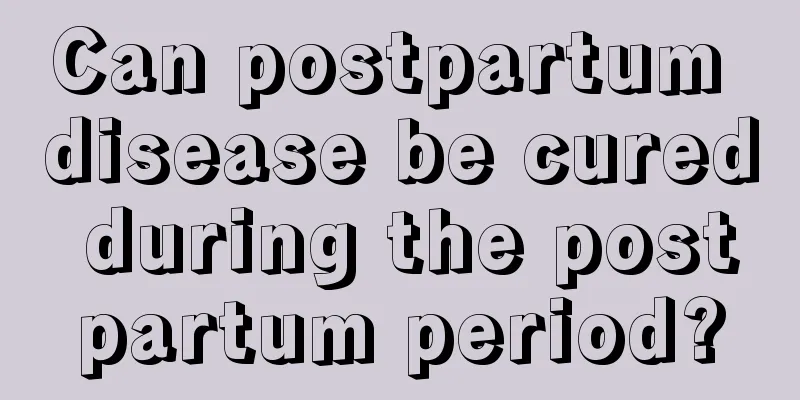Why can't I get pregnant during ovulation?

|
Under normal circumstances, having sex during ovulation can lead to successful conception, mainly because the probability of egg and sperm combining during ovulation is very high. However, it is also possible that conception will not be successful. This is related to many factors, such as irregular menstruation and poor sperm quality. In addition, having sex during ovulation can cause sperm leakage or uterine diseases, which can affect conception. You can understand the influencing factors. Why do I not get pregnant even though I have sex during my ovulation period? 1. Ovarian hypoplasia and ovulation dysfunction: Although ovulation occurs, the corpus luteum function is not sound due to incomplete ovarian development, which will also affect the development of follicles and egg release, and ultimately cause infertility. 2. Uterine and cervical factors: Factors such as abnormal cervical development, chronic cervical inflammation, uterine hypoplasia, endometriosis, etc. may also cause female infertility. Once the above symptoms are found, it is best to go to the hospital for examination and treatment in time. 3. Genital malformation: Congenital abnormalities in the development of the reproductive organs or acquired genital organ diseases, such as vaginal malformation, vaginal stenosis, and membrane obstruction in underage females, can hinder the patency and function of the reproductive tract from the vulva to the fallopian tube, preventing sperm from swimming and combining with the egg, resulting in ovulation but no pregnancy. 4. Immune factors: It refers to the presence of antisperm antibodies in the female reproductive tract or serum, which cause sperm to agglutinate each other, lose vitality or die, leading to infertility or sterility. In addition, some infertile women have antibodies against their own egg zona pellucida in their serum, which can prevent sperm from penetrating the egg and fertilizing it, and can also cause infertility. 5. Fallopian tube factors: Fallopian tube blockage, hydrosalpinx, fallopian tube adhesions and fallopian tube malformations are all important causes of infertility. Infertility caused by fallopian tube factors is also the most common clinically. The primary factor to consider when ovulating but not getting pregnant is the fallopian tube factor, which can be diagnosed through angiography. What are the symptoms of ovulation? 1. Decreased appetite: Studies have shown that women eat the least during their ovulation period in a menstrual cycle. Experts point out that this is the result of human natural instincts that have been preserved to this day - female animals during ovulation will focus more on finding the opposite sex for mating rather than finding food. 2. Energetic: This is also a natural instinct inherited from humans. In order to successfully attract the opposite sex, women during ovulation will become energetic and love to show themselves. 3. Increased sexual desire: Generally speaking, women's sexual desire will be particularly strong during their ovulation period, which is a reflection of the fact that women's body signals that they want to get pregnant have reached their highest level. What are the symptoms of a woman's ovulation period? 4. Increased leucorrhea: Increased leucorrhea Leucorrhea is a woman's vaginal discharge during ovulation. The leucorrhea of normal women is an odorless, slightly acidic viscous substance that has the functions of moistening the vagina, excreting waste, and inhibiting the growth of pathogens. It is a normal physiological phenomenon. 5. Increased body temperature: During the ovulation period, a woman's body temperature will be higher than before, but because the body temperature is greatly affected by the outside world, if you do not rely on a thermometer and do not measure the body temperature over a long period of time, you generally cannot detect the changes in body temperature. 6. Ovulation pain: Some women will experience mild pain on one side of the lower abdomen about 14 days before the menstrual cycle. Sometimes it is just a vague discomfort, but in a very small number of women, the pain is very obvious. The pain usually lasts for 1-2 days and then disappears. This pain is called "ovulation pain". |
<<: Is it better to have sex in the morning or at night?
>>: Can pregnancy be detected after 10 days of intercourse?
Recommend
How to diagnose uterine prolapse?
How should uterine prolapse be diagnosed? The ute...
Self-management of chronic heart failure
Author: Zheng Zhichang, deputy chief physician of...
Will a small amount of menstruation lead to infertility?
Will scanty menstrual flow cause infertility? Lig...
Can I have foot massage while breastfeeding?
Women can do some foot massage during breastfeedi...
What to do if you feel cold during early pregnancy
What should I do if I feel cold all over during e...
How to treat painful urination and hematuria with medicine
The phenomenon of stinging pain and hematuria whe...
Vagina itching
Women should take good care of their private part...
Reaction after amniocentesis
Amniocentesis is a common pregnancy test. Pregnan...
Mycoplasma, influenza A and influenza B are sweeping in. Protecting children starts from the family | A series of popular science interpretations of winter respiratory diseases
Editor's note: Recently, Guangming Online'...
Does perming affect pregnancy?
In fact, after pregnancy, many expectant mothers ...
Is breast cyst serious? Women must know
In recent years, due to the increasing life and w...
What medicine can supplement estrogen?
When it comes to supplementing estrogen, it is an...
Which department should I go to for a checkup of uterine cold?
For women, they may suffer from irregular menstru...
Documents required after pregnancy
Most pregnant women feel very happy during pregna...







![[Medical Q&A] Can benign tumors grow on the cervix?](/upload/images/67f0e81492249.webp)

